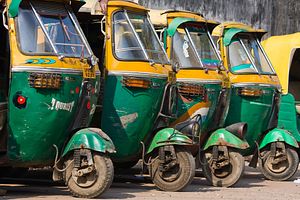Being part of the ‘economy of things’ is much less glamorous in India than in cities like San Francisco. Strict laws determine how companies can operate: ride sharing companies in India are frowned upon for charging “surge prices” when rides are in high demand, a sore spot for American customers in New York and Los Angeles.
India takes a much more hands-on regulatory approach to ride sharing: raiding cab dispatchers, demanding advance taxes whenever possible, and insisting upon fixed fare rates. For Uber, which has a stranglehold on the global industry, dealing with those rules in its second-biggest market has been onerous. After a passenger in Delhi alleged that a driver raped her last year, the company has struggled to regain its footing. The San Francisco-based company launched a cash-based rickshaw pilot earlier this week, in another effort to adapt.
That has opened the door for indigenous competitors to move in. Chief among them is OlaCabs, which has about 100,000 cabs across 85 cities in India. It offers a food service for riders, OlaCafé (similar to the UberFresh pilot program, recently unveiled in San Francisco), which offers a curated menu that ranges from Italian to Chinese options. Investors are taking note of the upstart company: Ola is in conversations with DST Global, run by Russian billionaire Yuri Milner, to raise $500 million in capital. The company counts Japan’s SoftBank Corporation, which has cultivated a portfolio of ride sharing alternatives to Uber, as a key investor. Ola also gobbled up competitor TaxiForSure last month, paying out $200 million in cash and stock options to acquire the start up.
Still, even as Ola is growing, regulators continue to show hostility toward ride sharing applications. Following the rape in an Uber car, Delhi authorities temporarily banned ride sharing companies, forcing the services to apply for licenses to operate in India’s second-largest city. Efforts on behalf of city officials and the federal ministry of information technology to enforce bans on ride sharing applications have proven ineffective, especially with demand growing all over the country. India’s taxi market is estimated at $10 billion. The drive of the consumer marketplace to embrace smartphones is only fueling that demand.
But the threat from regulators won’t go away. At the end of last month, Transportation Department regulators seized 100 cabs that had been driving illegally in Bengaluru. Those vehicles violated government rules, using GPS technology to charge fares ten times greater than the government-mandated rate. Ola’s service is no longer cheaper than a rickshaw. Raids will likely continue, no matter how big the market gets.
Either way, Ola will always have the benefit of being a newsmaker. On Wednesday, the company made headlines by publicly declining a passenger’s request for a Hindu driver. “Sorry, we do not discriminate against our drivers on the basis of their religion,” Ola tweeted. The company, like Uber, has a knack for finding its way to the center of attention. That will be a key advantage as the market continues to grow.

































